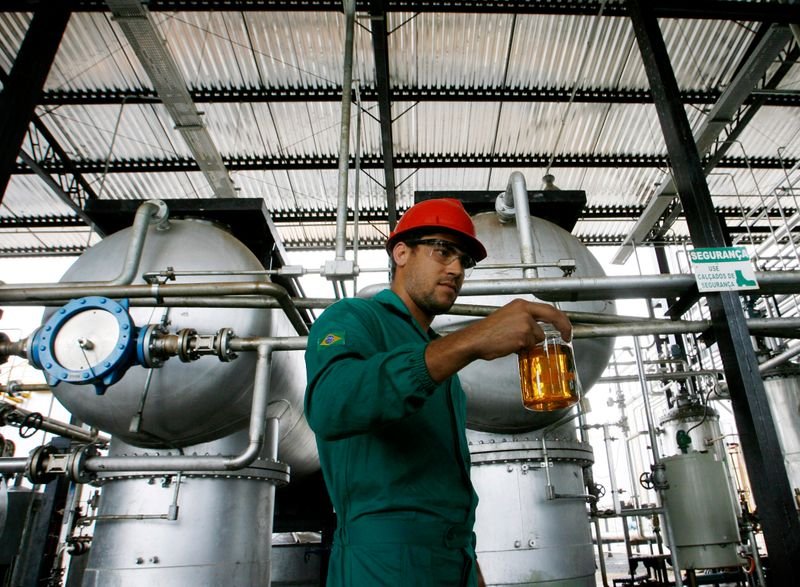Worker with a biodiesel sample in Iraquara (BA)
By Roberto Samora and Ana Mano
SAO PAULO (Reuters) – Brazil’s biodiesel and soy industry has not yet surrendered to a government decision this week that establishes a less than 10% mixture of the product in diesel for the entire year of 2022, and believes in a reversal of the measure as soon as President Jair Bolsonaro has all the information about the costs and losses.
And these sectors believe that they are not alone in this movement. In addition to the powerful lobby of the soy industry, the main item in Brazilian agribusiness and also a raw material for around 75% of biofuel, the biodiesel industry believes it has the support of meat processors, consumers of soy bran, an important feed ingredient. animal.
The idea is for the government to go back and revert the mixture to the 13% biodiesel in diesel that should have been in effect for most of the year, which did not happen as a result of a government decision due to higher raw material costs. For 2022, however, the segment believes that higher stocks after record harvests will bring relief to the market.
“The Parliamentary Front for Biodiesel will act, as soon as the President of the Republic knows of the repercussions, it will certainly change its position,” said Francisco Turra, president of the Board of Directors of the Association of Biofuel Producers of Brazil (Aprobio).
Turra, former minister of Agriculture and former president of the Brazilian Association of Animal Protein (ABPA), which represents poultry and swine producers, commented that the decision of the National Energy Policy Council (CNPE), made up of several ministries, followed a position of the government’s economic area. But fears about costs are not justified, and that should be clarified soon, he added.
On the contrary, the impacts to the economy can be more damaging if B10 is maintained. He said that the sector prepared for a 14% biodiesel blend in March of next year, as per a previous government resolution.
“There is a huge loss in the investments made and in the jobs that would be generated, not to mention the expenses with importing diesel, we are spending billions of dollars on fossil diesel when we could have a green job”, he commented.
For Aprosoja Brasil, who represents the soy growers, “the reduction in demand for soy oil can, indeed, harm the sector and negatively affect prices”.
Thus, Aprosoja said in a note on Wednesday that “it expects the decision to be reversed as soon as possible, immediately resuming B13 and progressivity to B15 as provided for in CNPE Resolution 16/2018” – the B15 is scheduled for 2023.
According to industry data, with the reduction of the percentage to 10%, the Brazilian soy agroindustry will stop processing in 2022 about 6 million tons of this oilseed, leaving the product to be exported in natura – which indicates that there is no need to reduce the mixture. impact on the supply of soy oil.
In addition, Brazil will also no longer generate 1.2 million tons of oil and 4.8 million tons of bran, as quoted by data from another sector entity, Abiove, which projects ending stocks in 2021, advancing to 5, 8 million tonnes of oilseed, double the start of last season. Reserves are expected to increase further by the end of 2022, with the confirmation of a new record crop.
“With the reduction in crushing, there is pressure on input prices, and ends up causing a rise in prices, as happened with corn (due to the crop failure), we had to import corn, the price of chicken went up,” said Turra.
“If there is more availability, there is more bran for export… and there is plenty of leftover bran for the domestic market, and there is no pressure on prices,” said Turra, noting that poultry and pork exports are growing in double digits.
On the argument that biodiesel increases diesel costs, data from another entity, Ubrabio, points out that the impact was “insignificant”, 0.1 percentage point, in the formation of the final price of diesel sold to consumers, between January and October.
Turra also said that there are many “antagonistic forces” interested in the topic. “For many it is advantageous to continue importing fossil diesel,” he declared, without specifying.
In addition to the question of costs, members of the fuel sector and even entities representing consumers have stated that the increase in the mixture generates quality problems for the diesel sold at gas stations, which the biodiesel industry does not agree with.
The National Confederation of Transport (CNT) and the association that represents the vehicle assemblers, Anfavea, defended in October, at a hearing in the Senate, that the biodiesel blend be set at 10%, citing that levels above this index create problems for the engines.
(By Roberto Machel)

See too
+ Horoscope: check today’s forecast for your sign
+ Video: Driver leaves Tesla car on autopilot and sleeps on SP highway
+ Food stamps: understand what changes with new rules for benefit
+ See which were the most stolen cars in SP in 2021
+ Expedition identifies giant squid responsible for ship wreck in 2011
+ Everything you need to know before buying a crockpot
+ Discovered in Armenia most eastern aqueduct of the Roman Empire
+ US Agency warns: never wash raw chicken meat
+ Passenger attacks and pulls out two stewardess teeth
+ Aloe gel in the drink: see the benefits
+ Lemon-squeezing trick becomes a craze on social media
+ Lake Superior: the best freshwater wave in the world?
#Biodiesel #soy #industry #Brazil #believes #reversal #smaller #mixture #cites #stocks #ISTOÉ #DINHEIRO
source https://pledgetimes.com/biodiesel-and-soy-industry-in-brazil-believes-in-reversal-of-smaller-mixture-cites-stocks-istoe-dinheiro/
Disqus comments